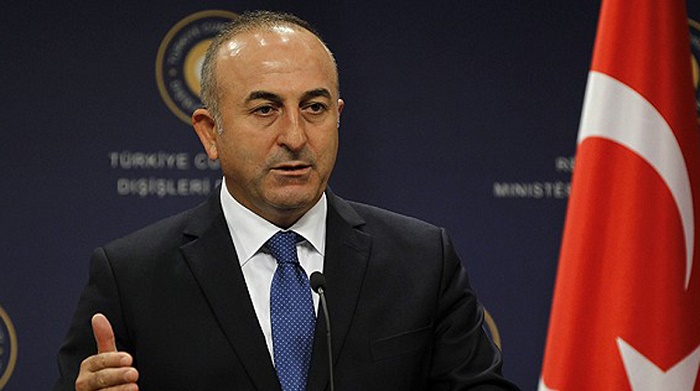Ankara said earlier that the Netherlands would pay a price for its anti-democratic steps against Turkish ministers this weekend.
The Dutch government blocked both Cavusoglu and Turkish Family Minister Fatma Betul Sayan Kaya from holding rallies there Saturday.
Cavusoglu said that there was no difference between current liberal social democrat coalition government and the far-wing racists leader Geert Wilders’ policies.
“The rhetoric and policies of the current liberal social democrat coalition government of the Netherlands are not different from [that of the far-right leader Geert] Wilders,” Cavusoglu said, adding their attitude to attract local voters in upcoming election later this week.
“And after the election, it doesn’t matter who wins, I think the supporters of Wilders will be happy.”
Ankara is weighing possible sanctions against the Dutch government as Cavusoglu said in an earlier remark that an official apology would not be enough for the normalization of the relations with Turkey.
“Of course, we will not violate the international rules and democratic standard, as they [the Dutch government] did. We respect international laws and standards,” Cavsuoglu said.
He added: “We will not target the Dutch people, We, will not harm them. It is not their mistake. Dutch people are friends of Turkey. We have been friends [with Dutch people] for 400 years. We celebrated 400th anniversary of the diplomatic relations with Dutch. So, we are not going to target Dutch people.”
He rejected the Dutch accusation that his flight permit was cancelled over security concerns.
“I found this word nonsense,” Cavusoglu said and continued, “There was no problem in the previous meeting, no security concern, nothing. But why this time…. Am I a threat?”
He stressed that the Turks living abroad are not been radicalized and they are not threat to their host countries.
“I asked this questions to many foreign ministers: ‘Is there any single Turk living there is radicalized or are terrorists?’ They said ‘no’.”
“So, what is the security problem there? They even don’t give me any details about that. I am the foreign minister of Turkey,” said Cavusoglu.
Double standards
Turkey has said the Dutch government supported the 'No' campaign for an upcoming referendum on key constitutional changes in Turkey.
Cavusoglu refuted allegations the new constitutional reform will give the country's president a power to appoint all members of the Supreme Board of Judges and Prosecutors (HSYK), Turkey's highest decision making body in judicial affairs.
“This is not also true. This is a black campaign,” he added. “According to current constitution president has right to appoint only four [out of eleven members] of them to the higher council. And according to the new package, the president has the authority, the right to appoint only four of them. There is no difference. And seven of them will be elected by the Turkish parliament.”
Cavusoglu said that in many European states the king or president appoints all members of the supreme judicial council.
“Let me give the example from some European countries. For example, in Sweden, all the members are nominated by the justice minister and appointed by the king. All of them. And it is not different in other countries.… All of them are nominated by the parliament and appointed by the king. And in France all of them are appointed by the president.”
He said it was unfair to criticize the proposed Turkish system while presidents or kings in many European countries have much more powers than what is being proposed as part of the constitutional reforms package in Turkey.
Over the weekend, Cavusoglu and Kaya, the Turkish family minister, were barred by Dutch authorities from addressing Turkish nationals on the upcoming constitutional change referendum on April 16.
When Turkish citizens in Rotterdam peacefully protested these developments, they were met by police using batons, dogs and water cannons, in what some analysts called a disproportionate use of force.
The events have drawn strong criticism from the Turkish government, which, earlier on Monday, sent diplomatic notes to the Netherlands in protest.
/Anadolu agency/
More about: #Turkey #Netherlands
















































